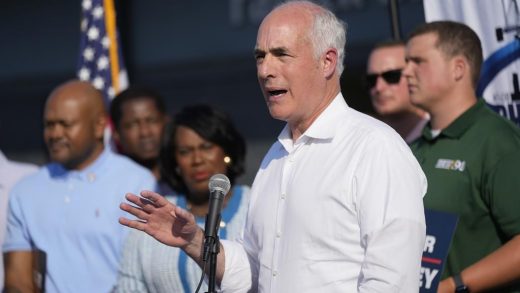At the funeral of a slain Zimbabwean activist, clashes and a low turnout mirror opposition decline

HARARE, Zimbabwe (AP) — A Zimbabwean opposition activist slain nearly two years ago was finally buried Saturday at an event marked by a low turnout and clashes between members of the main opposition party, highlighting its decline.
Moreblessing Ali, 46, a member of the opposition Citizens Coalition for Change, or CCC, was abducted in May 2022 outside a bar in Nyatsime, a neighborhood of Chitungwiza town on the outskirts of the capital, Harare.
Her body, cut into pieces, was found in a well in the area more than two weeks later, sparking anger. A man was later jailed for 30 years for the murder.
Ali’s remains had remained in a government morgue ever since. Her family refused to bury her until the release of a top official and family lawyer who was arrested after he said she had been murdered by ruling Zanu-PF supporters.
The official, Job Sikhala, spent close to two years in pre-trial detention and was released in January this year after a magistrate handed him a suspended prison sentence, paving the way for Ali’s burial on Saturday.
“We are relieved that she has finally rested,” said Wellington Ali, a brother to the slain activist. “But we are heartbroken because it is not a joke going two years without burying our relative. We have been through a lot.”
He said the family decided to skip the process of viewing the body, because “her body was getting really bad and decomposing.”
Sikhala, who quit the CCC upon his release from prison, said Ali “would not die in vain.”
“Her death will play a role in Zimbabwe’s political trajectory. She is going to inspire us to remain strong,” he said in a graveside interview at a cemetery near Chitungwiza.
Only a few dozen people, some singing political songs but not wearing party regalia, said farewell to Ali at the cemetery. Earlier in the day at her home, police officers with batons easily outnumbered mourners.
Such scenes are in stark contrast to the multitudes of CCC supporters and top officials who gathered to grieve Ali when her body parts were discovered in June 2022 – shedding light onto the disintegration of a party that was once a formidable force in Zimbabwe’s politics.
In August last year, the party’s candidate and then leader Nelson Chamisa narrowly lost presidential elections. However, the CCC took control of all major cities and towns, as well as winning enough parliamentary seats to deny the ruling ZANU-PF party the two-thirds majority it would need in order to change sections of the Constitution.
But the party has struggled to remain united since the elections after a man claiming to be the CCC secretary-general began removing dozens of elected officials, with support from parliamentary authorities, the government and the courts. Chamisa said his party didn’t even have a position of secretary-general and described the man as an imposter and fraudster.
The CCC has since split into many tiny factions after Chamisa quit the party in January, claiming that President Emmerson Mnangawa’s administration had hijacked the opposition and was engineering its decimation.
Some of Chamisa’s former associates accuse him of being dictatorial, charges he denies, claiming the movement has been a victim of state machinations.
The few mourners at Ali’s burial shoved and engaged in verbal insults as each faction tried to drown out the other and take control of burial proceedings.
The brawling opposition activists left before the burial was over, with only a handful of Ali’s family members remaining to complete the process.
Further to the opposition infighting, some local and international organizations such as Amnesty International say Mnangagwa is using intimidation, arrests and the courts to entrench his rule.
The 81-year-old former guerrilla fighter promised democratic reforms when he replaced longtime ruler Robert Mugabe after a popular army-backed 2017 coup but is now accused of being as repressive as his predecessor and mentor.
Mnangagwa attributes the near-collapse of the opposition to infighting and denies allegations of subverting democracy.
However, some fear for the future of Zimbabwe’s democracy now that the ruling party, which has since regained its two-thirds majority in the lower house of parliament, is governing without effective and organized opposition for the first time in decades.
“Locally, there are fears among people that we are moving towards a one-party state, with democracy dying a slow death,” said the Zimbabwe Catholic Bishops Conference in a letter marking the start of the church’s Lenten season in February.
Credit: At the funeral of a slain Zimbabwean activist, clashes and a low turnout mirror opposition decline


